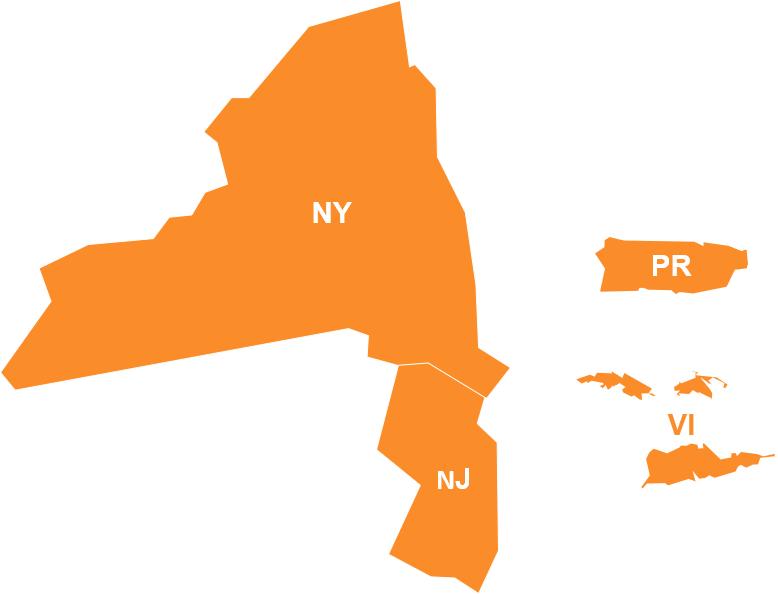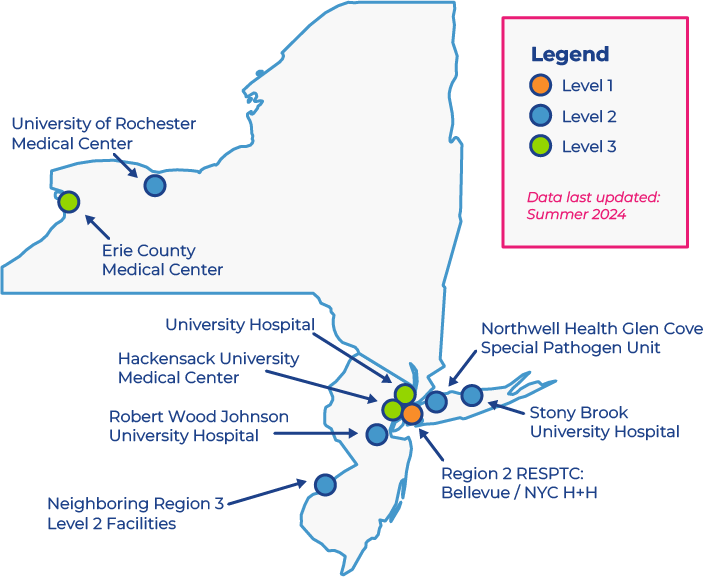About Us
The Region 2 NSPS Level 1 RESPTC at NYC Health + Hospitals/Bellevue serves as the regional hub for special pathogen preparedness and response efforts in New York, New Jersey, Puerto Rico, and the U.S. Virgin Islands.
In addition to leading coordination and resource-sharing efforts throughout the region, the Region 2 RESPTC has the capability and capacity to care for patients suspected of or infected by a special pathogen. As New York City’s flagship safety net hospital, Bellevue is uniquely positioned to provide high-quality care for patients that need it the most – preserving the basic tenets of patient-centered, equitable care.
History
As America’s oldest public hospital, Bellevue has over 200 years of experience caring for special pathogen patients. Bellevue’s clinical expertise is built upon years of special pathogen responses starting with the Yellow Fever outbreak in the 1790s and spanning to more recent responses including the Ebola and mpox responses.
Bellevue is one of the original RESPTCs, serving since the program launched in 2015. Due to Bellevue’s role leading the Ebola response, it was one of three institutions selected to form NETEC: a consortium to enhance national special pathogen preparedness. With hands-on experience from multiple outbreak responses, Bellevue continues to share promising practices to promote preparedness and response efforts.
History has shown that HHS Region 2 often sees the first waves of special pathogen outbreaks in the United States. As an international travel hub with three of the top 25 busiest airports in America, HHS Region 2 is at a heightened risk and must be prepared to identify, isolate, and care for special pathogen patients.

States and Territories in Region 2
Partners engaged through quarterly webinars
Special Pathogen responses since 2015
Facility Map

Bellevue’s Ebola Response
During the world’s largest outbreak of Ebola in 2014, infection incidents in New York reinforced the need for improved health care readiness to effectively counter emerging infectious disease threats. Supported by ASPR’s Hospital Preparedness Program (HPP), Bellevue’s Special Pathogens program provided vital support for Ebola care. As one of the nation’s leading facilities that provided safe and successful patient care during the 2014 outbreak, NYC Health + Hospitals/Bellevue was designated as a Regional Ebola and Other Special Pathogen Treatment Center in 2015. It was one of ten such centers across the country that received federal funding to maintain the capability to safely manage patients with confirmed Ebola or other severe infectious diseases under short notice. NYC Health + Hospitals/Bellevue was also named one of the three institutions to co-lead the National Emerging Special Pathogen Training and Education Center (NETEC). NYC Health + Hospitals/Bellevue’s response to the Ebola crisis is a testament to the extensive planning, training, and robust communication and coordination with our city, state, regional, and federal partners.
Bellevue’s Mpox Response
In the summer of 2022, New York City (NYC) was the national epicenter of the U.S. mpox outbreak. Yet even before NYC had confirmed its first positive patient, the Region 2 RESPTC activated its Special Pathogen Program to triage and treat patients infected with mpox. Through collaboration across multiple departments within Bellevue, hospitals across the city, and the NYC Department of Health and Mental Hygiene, the RESPTC established shared protocols, based in trauma-informed care, for patient transportation, screening, testing, treatment, vaccination, inpatient care, and telehealth services. In a situation where saving time saves lives, the RESPTC and its team of trained providers- nurses, epidemiologists, and pharmacists were invaluable to the success of NYC’s mpox response. Thanks to the RESPTC’s near-immediate response, emergency departments treated and admitted 158 mpox patients to hospitals across the NYC H+H system, and Bellevue vaccinated 335 individuals.
